Table of Contents
Home / Blog / Blockchain
Developing Your Own Secure Private Blockchain: A Step-by-Step Guide
December 27, 2023
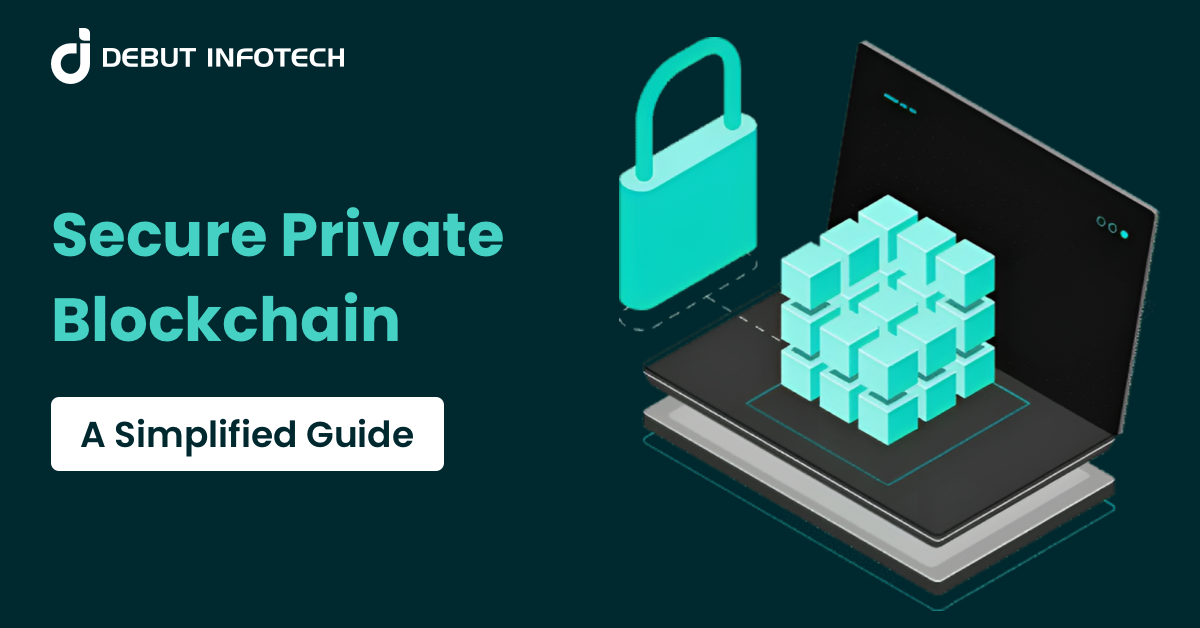
December 27, 2023
In today’s digital age, where finance and technology intertwine, digital investments have become a popular choice, attracting both experienced investors and newcomers. The rise of digital currencies like Bitcoin and Ethereum has ushered in a new financial era, offering remarkable returns and reshaping traditional markets.
However, the growing popularity of digital investments brings security challenges. Ensuring the safety of digital assets is paramount. This is where blockchain technology comes into play, serving as a beacon of security and control. But you must be thinking what private blockchain and how to build a blockchain network.
A private blockchain is a decentralized ledger controlled by an individual or a select group, who manage network access. It allows specific individuals to view and contribute to the data on the blockchain, providing enhanced privacy and control over public blockchains. This blog will delve deeper into this topic.
Private blockchains are increasingly favored by businesses for their ability to bolster data security, streamline operations, and enhance transparency. They offer a range of benefits, including improved security, privacy, efficiency, and cost savings, making them invaluable for innovation and new business opportunities.
Essentially, a private blockchain is a secure and controlled environment for digital assets, offering encrypted protection and restricted access. You can tailor a private blockchain to meet your specific needs while ensuring optimal security for your investments and data.
This blog aims to guide you through private blockchain development, its business benefits, and various applications. Join us as we explore the private blockchain world, uncovering its potential to transform your business.
Before we dive into the intricacies, let’s briefly define what a private blockchain is and how it operates.
Understanding Private Blockchain In Detail
A private blockchain is a special kind of online record-keeping system. It works like a digital diary that only certain people can use. These people are chosen and trusted, making it a safe place for keeping important information. This type of blockchain is perfect for companies or groups who want to keep their data private and under control.
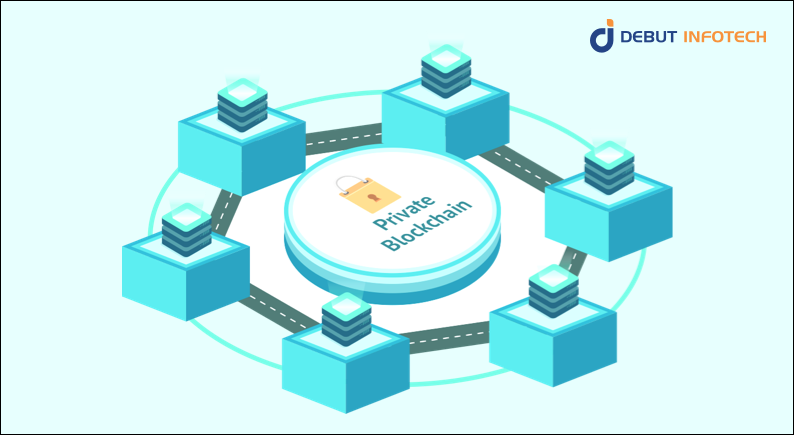
In a business setting, not just anyone can join this private blockchain. People need special permission to be part of it. This helps keep the information safe from hackers and theft.
Many types of businesses use private blockchains because they want to keep their data really secure. This includes banks, hospitals, companies that track products from start to finish, and even government groups. The best private blockchain example is banks that are using it to safely move money across countries between approved people. This is faster and meets all the rules they need to follow.
Related Guide: What Is Blockchain Technology & How Does It Work?
How To Develop A Private Blockchain From Scratch?
Developing a private blockchain from scratch is a complex but rewarding endeavor. It involves several key steps, from conceptualizing the purpose to blockchain implementation and testing its functionality. In this guide, we’ll explore how to develop a private blockchain, including considerations for design, technology choices, security measures, and deployment strategies.
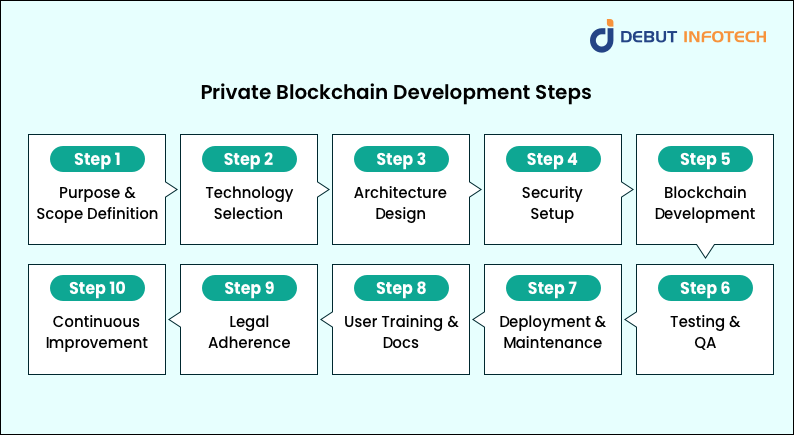
1. Defining the Purpose and Scope
The first step is to clearly define the purpose and scope of your private blockchain. Consider the following questions:
- What problem are you trying to solve? Identify the specific issues or inefficiencies that a blockchain solution can address.
- Who are the intended users? Understanding your audience will guide the features and accessibility of your blockchain.
- What kind of data will be stored? This influences the blockchain’s structure and security requirements.
2. Choosing the Right Technology
Deciding on the technology stack is crucial. You’ll need to select:
- Blockchain Protocol: Choose a protocol that suits your needs. Options include Ethereum (using tools like Solidity for smart contracts) or Hyperledger Fabric (suitable for enterprise solutions).
- Programming Languages: Commonly used languages include Solidity for Ethereum-based applications, Go for Hyperledger, or even Python for blockchain development.
- Database and Storage Solutions: Decide on a database that fits the data structure of your blockchain.
Also Read: Top Blockchain Platforms for 2025: A Comprehensive Review
3. Designing the Architecture
The architecture of your private blockchain should be carefully planned, considering:
- Nodes and Network Structure: Define how many nodes will be in your network and how they will communicate. In a private blockchain, nodes are typically controlled by trusted entities.
- Consensus Mechanism: Unlike public blockchains, private blockchains can use simpler mechanisms like Proof of Authority (PoA) or Practical Byzantine Fault Tolerance (PBFT).
- Smart Contracts: Design the rules and conditions that will automate processes on your blockchain.
4. Setting Up Security Measures
Security is paramount in a private blockchain. Key considerations include:
- Access Control: Implement robust authentication and authorization mechanisms to control who can access the blockchain.
- Data Encryption: Use encryption to protect data in transit and at rest.
- Regular Audits: Plan for regular security audits and updates to ensure the ongoing integrity of the blockchain.
You May Like To Read: Layer 1 Blockchain: Decoding Scalability and Security
5. Developing the Blockchain
With the plan in place, you can start the development process:
- Building the Core: Develop the basic blockchain structure, including block creation and validation rules.
- Implementing Smart Contracts: Code the smart contracts that will define the business logic of your blockchain.
- Integrating APIs: Develop APIs for interaction with external systems and user interfaces.
6. Testing and Quality Assurance
Testing is crucial to ensure the reliability and security of your blockchain:
- Unit Testing: Test individual components for expected functionality.
- Integration Testing: Ensure different parts of the blockchain work together seamlessly.
- Stress Testing: Test the blockchain’s performance under high loads and potential attack scenarios.
7. Deployment and Maintenance
Deploy your blockchain in a controlled environment first:
- Pilot Launch: Run a pilot version within a limited user group to gather feedback and make necessary adjustments.
- Scalability Considerations: Ensure your blockchain can handle growth in terms of users and data volume.
- Maintenance Plan: Set up a regular update and maintenance plan to address any emerging issues or vulnerabilities.
8. User Training and Documentation
Educate your users and provide comprehensive documentation:
- Training Sessions: Conduct training for users to familiarize them with the blockchain’s functionality and best practices.
- Comprehensive Documentation: Provide detailed guides and documentation for users and administrators.
9. Legal Compliance
Ensure your blockchain adheres to relevant legal standards and regulations, especially if dealing with sensitive data.
To learn how blockchain technology optimizes regulatory compliance processes in enterprises, click and read the detailed guide.
10. Ongoing Evaluation and Improvement
Finally, continually monitor the performance and utility of your blockchain:
- Feedback Loops: Establish mechanisms to gather user feedback and monitor system performance.
- Iterative Improvements: Be prepared to make iterative improvements based on feedback and technological advancements.
Understanding the Functioning of Private Blockchain
Private blockchains work like special online notebooks that only certain people can use. Unlike public blockchains that anyone can join, private blockchains are for a specific group who have permission. This makes them more secure and private.
In a private blockchain, only approved people can add information or check the data. There’s a special system in place to make sure only these trusted people can make changes. This keeps the information safe and private, which is great for businesses or groups that need to protect their data.
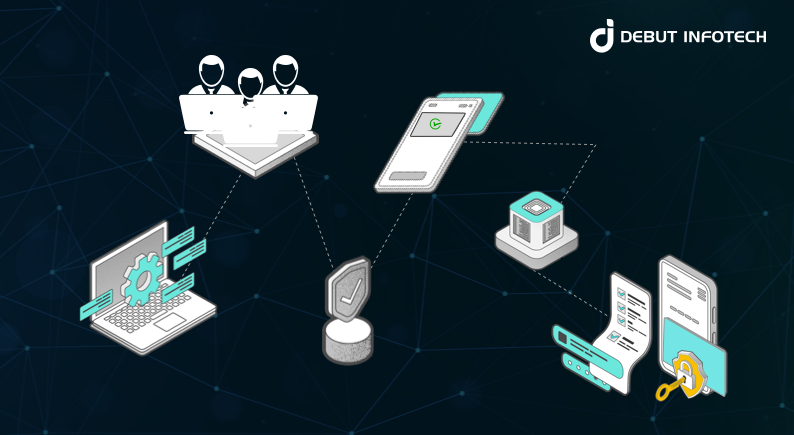
These blockchains use a special method to agree on what information is added. This method is faster and more efficient than in public blockchains. It means that private blockchains can handle data quickly and more smoothly.
Private blockchains are perfect for companies in different areas like banking or healthcare. They can use this technology to keep important information safe and manage it better.
Related Read: Enterprise Blockchain: Fostering Business Innovation
How Business Can Benefit From Private Blockchains?
In the evolving digital landscape, businesses continuously seek innovative solutions to enhance their operations, and private blockchains have emerged as a transformative technology in this quest. Private blockchains, distinct from their public counterparts, offer numerous advantages tailored to business needs. This comprehensive analysis explores how private blockchains can revolutionize various aspects of business operations.
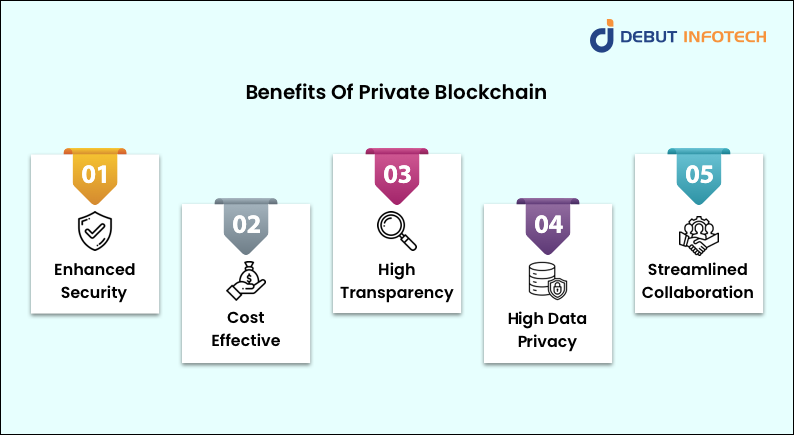
Enhanced Security: The Cornerstone of Trust
Security is a paramount concern for any business, and private blockchains excel in this domain. These blockchains function within a closed network, where access is strictly controlled and monitored. This gated approach significantly reduces the risk of external attacks and unauthorized access, ensuring that sensitive business data remains protected. By leveraging encryption and consensus algorithms, private blockchains provide a secure environment for storing and managing data, fostering a foundation of trust and reliability essential for business operations.
Cost Savings and Boosted Efficiency: Streamlining Operations
The implementation of private blockchains can lead to substantial cost savings and efficiency improvements. By automating various processes through smart contracts, businesses can reduce the need for intermediaries, thereby lowering transaction costs. Additionally, the streamlined process results in faster transaction times, enhancing overall operational efficiency. The inherent efficiency of private blockchains also translates into reduced administrative burdens, allowing businesses to allocate resources more effectively.
Increased Transparency: Building Confidence
Despite being private, these blockchains offer a level of transparency that is beneficial for businesses. The ability to track and verify transactions on a blockchain fosters an environment of accountability and trust among permitted users. This transparency is particularly advantageous in sectors like supply chain management, where tracking the provenance and status of goods is crucial. Moreover, it builds confidence among stakeholders, as they can access verifiable and immutable records of transactions.
Enhanced Data Privacy: Safeguarding Sensitive Information
Private blockchains provide an ideal solution for businesses concerned with safeguarding sensitive data. Unlike public blockchains, where data is exposed to a wide audience, private blockchains restrict access to authorized users only. This controlled access ensures that confidential business information, be it financial data or trade secrets, is not exposed to competitors or the public, maintaining a competitive edge.
Streamlined Collaboration: Fostering Synergy
The collaborative aspect of private blockchains is a game-changer for businesses. By allowing selected members to access and contribute to the blockchain, these platforms facilitate seamless collaboration across different departments or even with external partners. This fosters synergy and ensures that all parties are on the same page, leading to more cohesive and effective teamwork.
Scalability and Customization: Tailoring to Business Needs
Private blockchains offer a high degree of scalability and customization, which is essential for businesses with evolving needs. Companies can scale their blockchain solutions up or down based on demand, ensuring that the technology remains aligned with their growth trajectory. Additionally, the ability to customize various aspects of the blockchain, from consensus mechanisms to access controls, allows businesses to tailor the technology to their specific requirements.
Conclusion
Private blockchain development offers numerous benefits for businesses, enhancing security, efficiency, and privacy while supporting collaboration and scalability. These blockchains are pivotal for success in today’s digital landscape, aiding in safeguarding sensitive data and boosting transparency. For businesses aiming to stay competitive, assessing the need for a private blockchain is a crucial step.
Debut Infotech, a seasoned private blockchain development company, brings extensive expertise to the table. Our skilled team assists businesses throughout the creation process, from initial conceptualization to deployment. Our focus on customer-specific needs ensures that each blockchain solution is tailored to align with unique business objectives. Emphasizing security and efficiency, we employ advanced encryption and consensus algorithms to forge robust, scalable networks.
For a customized private blockchain solution that caters to your business’s unique requirements, consult with our expert now. We are committed to helping you harness the power of private blockchain technology for your venture.
FAQ: Private Blockchain
A. A private blockchain, managed by a single organization, offers restricted access, enhancing security and control. In contrast, a public blockchain is open to anyone, allowing unrestricted participation and transparency. While public blockchains are decentralized, private blockchains offer a centralized approach, often preferred by businesses for their exclusive control and privacy features.
A. The time required to develop a private blockchain varies based on complexity and requirements. Typically, a blockchain development company may take several months to over a year. Factors like the scale of the network, features, and integration needs profoundly influence the development timeline. An experienced blockchain development agency can provide a more accurate estimate after understanding specific project requirements.
A. The cost to build an app on a private blockchain network varies widely, depending on the app’s complexity, features, and scale. Generally, expenses can range from tens of thousands to several hundred thousand dollars. A blockchain development services provider can offer a precise quote after evaluating the specific needs and scope of the project.
A. To choose the best blockchain development agency for private blockchain, research their portfolio, client testimonials, and expertise in blockchain technology. Look for a blockchain development firm like Debut Infotech that has a proven track record in delivering similar projects. It’s crucial to assess their technical skills, project management capabilities, and commitment to quality to ensure they align with your project needs.
Talk With Our Expert
Our Latest Insights
USA
2102 Linden LN, Palatine, IL 60067
+1-708-515-4004
info@debutinfotech.com
UK
Debut Infotech Pvt Ltd
7 Pound Close, Yarnton, Oxfordshire, OX51QG
+44-770-304-0079
info@debutinfotech.com
Canada
Debut Infotech Pvt Ltd
326 Parkvale Drive, Kitchener, ON N2R1Y7
+1-708-515-4004
info@debutinfotech.com
INDIA
Debut Infotech Pvt Ltd
Sector 101-A, Plot No: I-42, IT City Rd, JLPL Industrial Area, Mohali, PB 140306
9888402396
info@debutinfotech.com




Leave a Comment